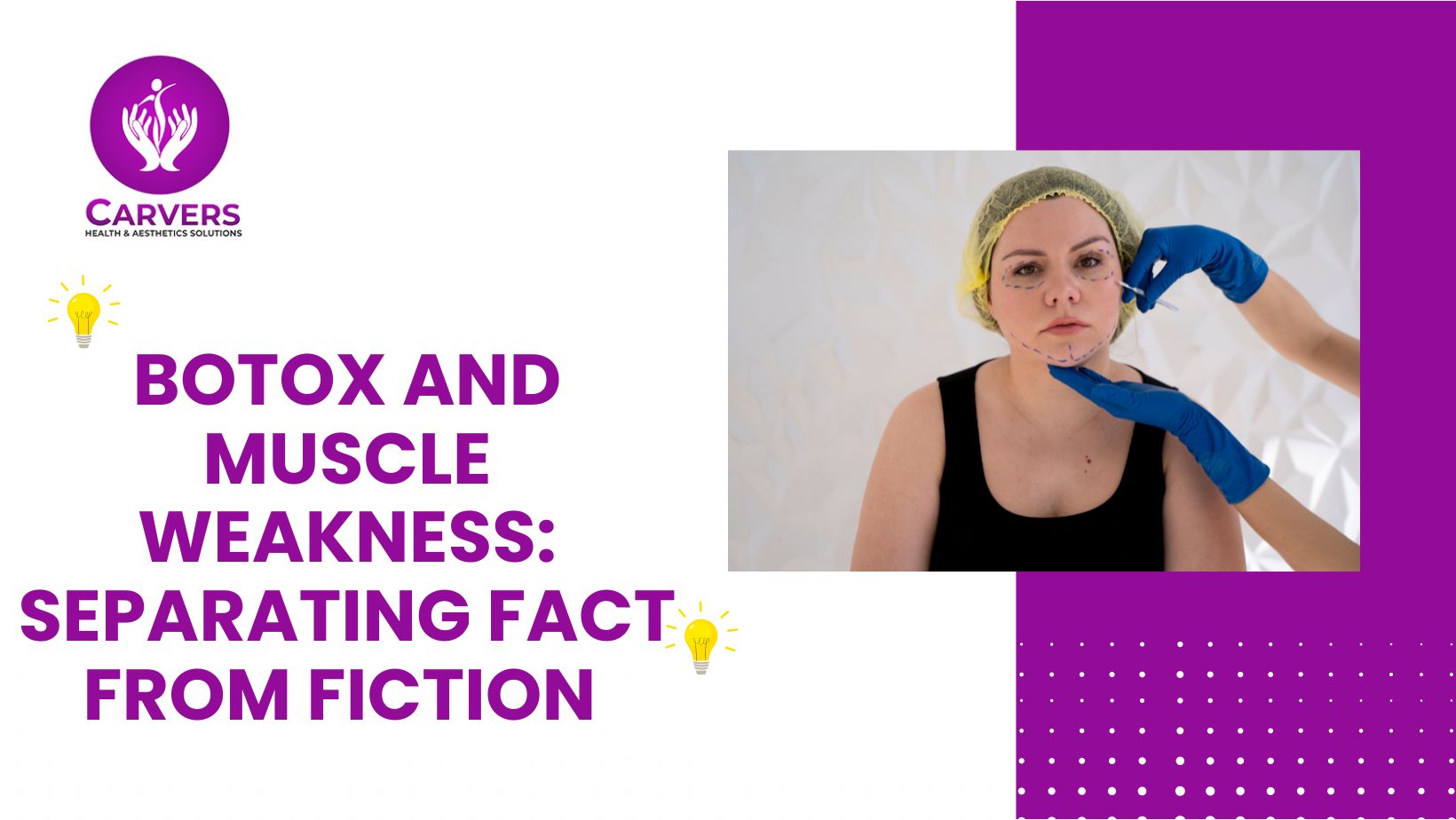
Botox And Muscle Weakness: Separating Fact From Fiction
At Carvers, we prioritize providing clear, accurate information about aesthetic treatments to help our clients make informed decisions. Botox is currently one of the most widely used cosmetic procedures. Over the years, Botox has been used to treat a range of concerns, from reducing the appearance of fine lines and wrinkles to managing medical conditions like migraines and excessive sweating. However, one persistent myth that surrounds Botox treatments is the belief that it causes muscle weakness.
This myth, while widespread, is largely unfounded. In this article, we will separate fact from fiction and explore the science behind Botox, debunking myths around muscle weakness and highlighting what clients can actually expect when undergoing this treatment.
What Is Botox, and How Does It Work?
A neurotoxin called Botox (botulinum toxin type A) momentarily inhibits nerve signals to the muscles. When injected into specific areas of the face or body, it causes muscles to relax, which results in the smoothing of wrinkles or reduced movement in overactive muscles. While Botox is most famous for its cosmetic uses, it is also widely used in the medical field to treat conditions such as chronic migraines, muscle spasms, and even bladder dysfunction.
After three to six months, the effects of Botox usually wear off and muscle function gradually returns to normal. One of the most important things to understand is that Botox doesn’t “weaken” muscles in the traditional sense—it temporarily relaxes them. The muscles regain full function after the treatment wears off.
Botox and Muscle Weakness: The Fiction
The fear that Botox can lead to permanent muscle weakness is a common misconception. Many people mistakenly believe that by relaxing certain muscles, Botox will cause long-term or even permanent damage, preventing the muscles from functioning properly. This is simply not the case.
Common Misconceptions
Botox Causes Permanent Damage: One myth is that Botox permanently damages the muscles it is injected into, leading to lasting weakness. In reality, Botox only affects the muscles temporarily. The toxin is metabolized by the body, and after a few months, the muscles regain full function as the nerve signals are restored.
Botox Will Affect Nearby Muscles: Some people worry that Botox might spread to nearby muscles, causing unwanted weakness or movement issues in areas outside the treatment zone. However, when administered by a trained and experienced professional, Botox stays localized to the targeted area and does not affect surrounding muscles. At Carvers, we ensure precise application to minimize any risk of unintended effects.
Botox Is Unsafe for Regular Use: Another misconception is that repeated Botox treatments will eventually cause permanent muscle weakness or diminish muscle function over time. However, clinical studies and decades of use have shown that Botox is safe for regular treatments, and there is no evidence that it causes long-term harm to muscle tissues.
The Facts About Botox and Muscle Weakness
While Botox temporarily relaxes muscles, it doesn’t cause muscle atrophy or permanent weakness. The key lies in how Botox interacts with the nervous system and muscles. Acetylcholine, a neurotransmitter that instructs muscles to contract, is blocked by Botox. As a result, the muscles relax for a period of time, but they are not harmed or permanently altered.
Temporary Muscle Relaxation
After Botox treatment, the affected muscles are unable to contract fully, which leads to the desired outcome—whether that’s reducing wrinkles or controlling involuntary muscle movements. This effect lasts for a limited time (usually 3-6 months), and once the Botox wears off, the muscles regain their natural ability to contract.
In the case of aesthetic treatments, Botox injections target specific facial muscles that are responsible for expression lines, such as frown lines, crow’s feet, or forehead wrinkles. Once the treatment has worn off, patients will notice that their muscles return to their normal function. In some cases, the wrinkles may be less pronounced than before because the muscles have had time to “rest.”
No Long-Term Weakness
There is no evidence that Botox causes long-term or permanent muscle weakness. The body naturally metabolizes Botox over time, allowing the muscles to recover their normal function after the effects wear off. If a patient chooses to discontinue Botox treatments, their muscles will resume normal activity, and there is no residual muscle weakness or atrophy.
Furthermore, even after many rounds of treatment, Botox has not been shown to cause lasting damage to the muscles. Patients who have been using Botox regularly for years can still stop treatment without any lasting negative effects on muscle function.
Botox for Medical Conditions
Botox is widely used for treating medical conditions that involve overactive muscles, such as chronic migraines, muscle spasms, and even conditions like cervical dystonia (involuntary neck muscle contractions). In these cases, Botox helps by temporarily paralyzing or relaxing the overactive muscles, offering relief from painful or debilitating symptoms.
Even in these therapeutic uses, Botox doesn’t cause permanent weakness or damage. The treatment is tailored to relax muscles that are overactive, and once the effects wear off, muscle function returns to normal. This illustrates that Botox, when used in medical contexts, is both safe and effective.
Botox and Long-Term Use
Some individuals opt for regular Botox treatments for years, and concerns about long-term muscle effects often arise. The good news is that long-term use of Botox has been shown to be safe. Research indicates that the muscles treated with Botox will return to their normal function when the treatment is stopped. There is no permanent loss of strength, and patients who have been receiving Botox for many years can still retain their full range of motion and muscle strength after discontinuing treatment.
At Carvers, we offer professional, carefully administered Botox treatments that are both safe and effective, with minimal risk of unwanted side effects.
Conclusion: Separating Fact from Fiction
The myth that Botox causes muscle weakness is largely unfounded. Botox works by temporarily relaxing muscles, not by weakening or damaging them permanently. Once the effects wear off, muscle function returns to normal, and there is no long-term harm.
Whether you are considering Botox for cosmetic or medical reasons, rest assured that when administered by a trained professional like the team at Carvers, the treatment is both safe and effective. If you have concerns about how Botox might affect your muscles, consult with our experts for personalized advice and the highest standard of care.
Let us help you achieve your aesthetic goals with the confidence that your treatment is based on science, safety, and expertise.
